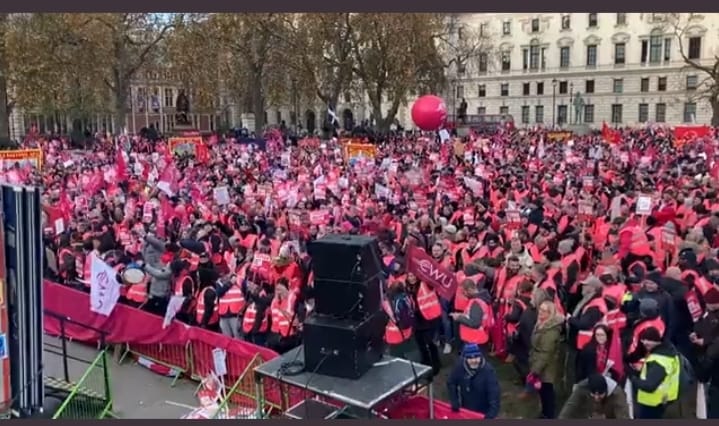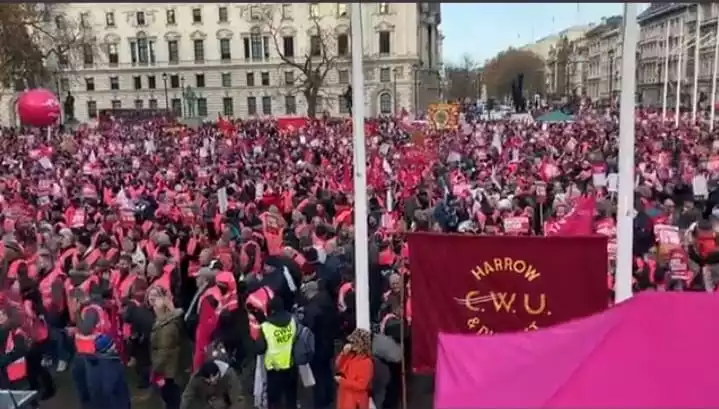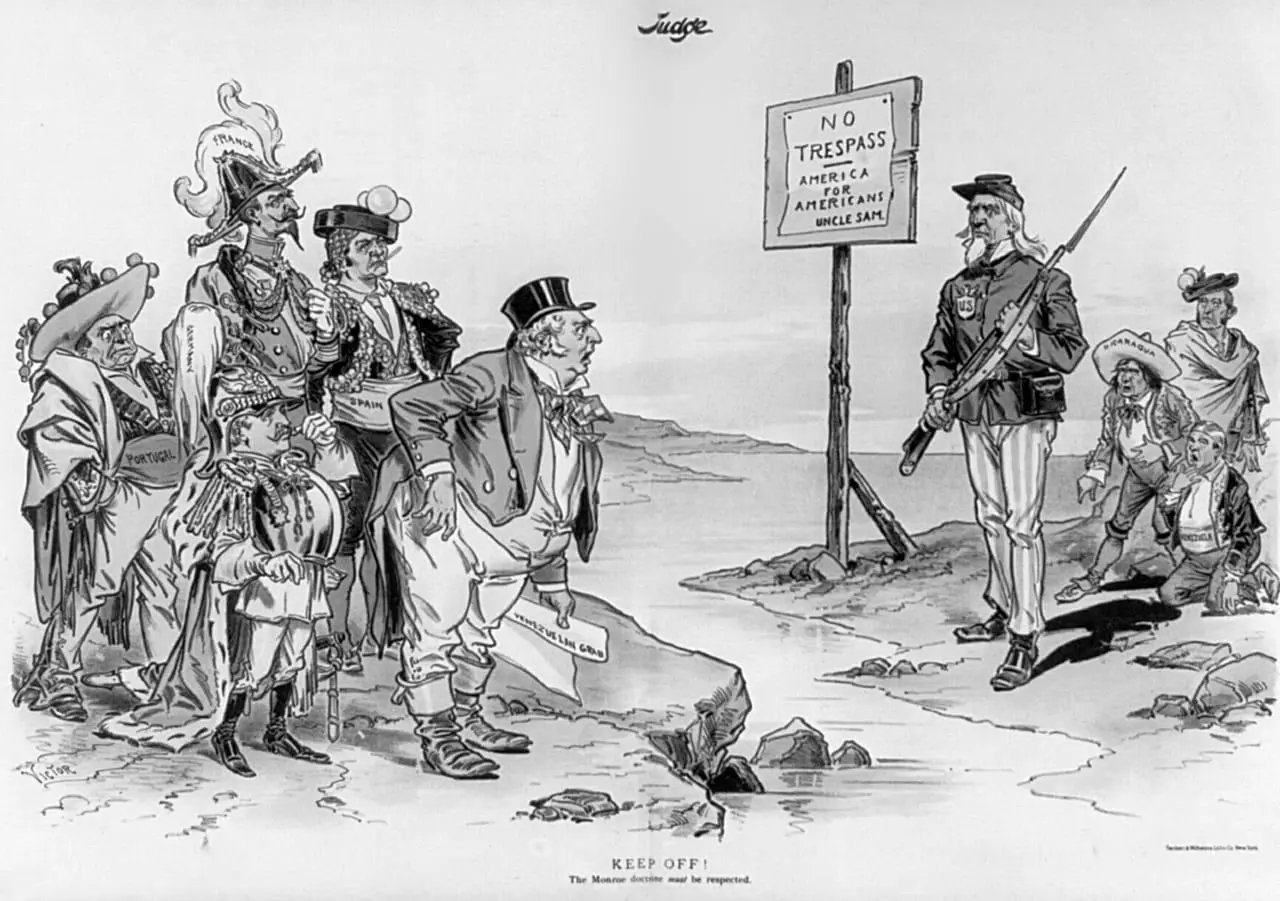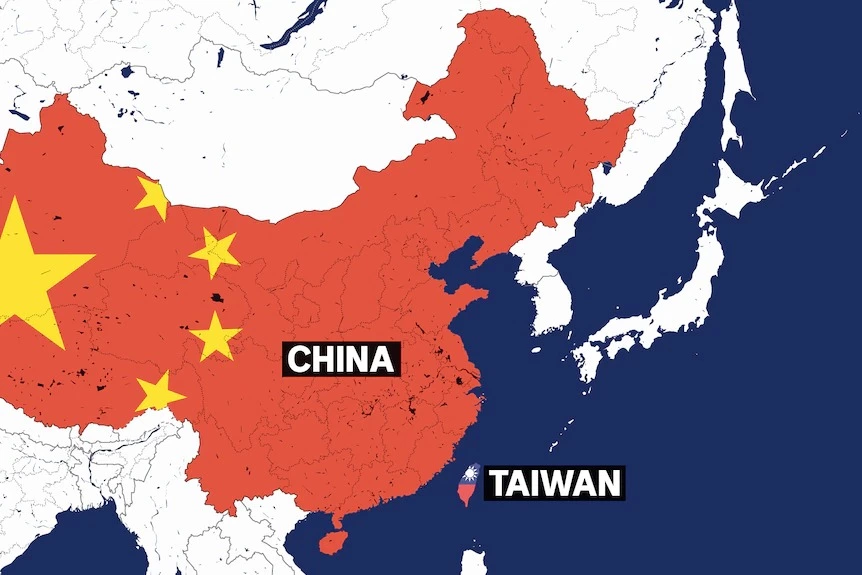Why is having a work position important? Because it is a central part of our lives. Humans define themselves by the work that they do. It can provide a means and opportunity for one to take care of not only themselves but their loved ones as well. At the same time, it can weigh heavily one’s mind, give one a feeling of being weighed down emotionally and psychologically , as with worries or physical distress.
The ongoing labor strikes that occurred and will continue to occur in Great Britain involving the Communication Workers Union (CWU) and the government is an example of what happens when workers make a stand for better wages, better benefits and better working conditions. Government indifference and at times CWU ambivalence reached the breaking point when a walkout occurred on October 13th this year and other walkouts that are scheduled during the month of December. Also, the Border Force workers are also set to strike ahead of Christmas and remain on strike through the holidays.
Their responsibility involves securing the border and facilitating the movement of individuals and goods while preventing those that would cause harm from entering the United Kingdom. Otherstriking CWU organizations (Rail Operators, Nurses, Scottish Teachers, and Ambulance Drivers) have aligned with the Postal Workers Strike, making it the biggest since 1989. This strike is very similar to the 1970 Postal Strike in the United States (US) which involved the National Letter Carriers Association (NALC) in March 1970. The only important difference between these strikes is that the NALC was the sole entity whereby CWU has five different organizations involved in their strike. All other issues are the same.
CWU is pushing for higher pay to match it to Britain’s inflation rate and better working conditions. CWU has stated that Royal Mail is planning structural changes, which would in effect transform employees in secure, well-paid jobs and make them dependent on the will of modernization (structural change). The public and businesses will face the end of daily deliveries and the end of the special relationships that letter carriers have with its customers and the public in every community in Great Britain. Royal Mail Executive Simon Thompson claims that their agenda is one of “modernization to meet change in respond to customer demand,” by altering working practices so that regular workers are re-employed on a casual or short – term basis. In other words, creation of a part time work force.Royal Mail has proposed elimination of Sunday delivery and implement later start and finish times. He based it on a loss of one million pounds a day whereby the CWU has called for an audit of their financial accounts. CWU countered saying that the post office imposed a pay freeze upon its letter carriers for fiscal year 2021/22 which triggered the dispute. Members voted 97% to strike. The post office made a thirty-fivemillion pounds profit for 2020/2021 andpaid their managers bonuses totaling two million pounds. Royal Mail’s initial pay offer was 2%, plus a lump sum of 250 pounds was added for 2022/23 to their basic offer. CWU conducted one day strikes at certain offices, to prevent major disruption of mail delivery.
Initially the strike was for all CWU members in the Post Office, but other business organizations within the CWU were having the same issues and became involved. The initial strike was followed up with another strike on June 4th at the Crown Office and another on June 6th for Admin & Supply members. Afterwards, the Post Office raised its initial offer to 3% and doubled the cash lump sum to five hundred pounds. During August negotiations, Royal Mail raised their pay offer to 5%, but the CWU felt that this was not enough in comparison to a 12.3% inflation rate.A typical Royal Mail Postman salary is 25,000 pounds.Salaries at Royal Mail can range from 16,000 – 30,000 pounds at a time where inflation is at 11.8%.
British Prime Minister (BPM) Rishi Sunak has been quoted to have plans in place to minimize any delays and hopes to avoid political infighting with Labour Party Sir Keir Stammer, who has stated that he will stand up for working people and accused BPM Sunak of grandstanding. Trades Union Congress General Secretary Fraces O’Grady urged both leaders to stop taking political pot shots and start negotiating over pay. Sir Starmer has stated that the Labour Party would oppose unworkable minimum service levels legislation While BPM Sunak insist that his government has maintained a reasonable stance and accepted independent reviews on appropriate pay. (Peter Aiken Fox News Reporter, 12/9/2022, United Kingdom).
During the 1970 Postal Strike in the United States, letter carriers risked it all by taking on the government which not only banned strikes by federal employees but also required them to pledge not to even talk about the right to strike. The union took it to court and successfully challenged the constitutionality of this “no strike loyalty oath” on First Amendment grounds. (Page 1, The Postal Record, March 2020)
As previously stated, the issues involving the United States Postal Strike of 1970 are almost identical. Low wages and poor working conditions led to their strike. What irked union employees was the 41% salary hike the US Congress had given itself just the year before just like the management bonuses that Royal Mail Executives gave themselves. (seven, The Great Postal Strike of 1970-AFL-CIO).Both unions decided not to accept sub-standard salaries by the US Congress and Royal Management. CWU wants a genuine cost-of-living pay raise while the proposed US Congress salary increases were less than the rise in cost of living. During the 1960’s, many NALC carriers worked two jobs and many had their wives work to remain in a comfortable family position to survive. Currently the collective bargaining agreement with the US Postal Service has a Cost-of-Living Allowance (COLA) which is based on a Consumer Price Index published by the federal government. Inflation increases trigger COLA payments to letter carriers. The CWU pay dispute is not complicated. They are striking for a pay rise that fully addresses their current cost of living.
As for the modernization issue, RM has reneged on a previous agreement (Pathway to Change agreement’s Key Principles Framework Agreement – The Pathway to Change 2021). RM has made changes to this agreement without negotiation and agreement from CWU. There is a mutual understanding that there has been a decline in letter mail and an increase in the parcel market, must like in the United States. The pandemic affected all businesses in both countries and in lieu of pandemic restrictions in both countries, customers elected to do online shopping. What both parties disagree on in this agreement is how change is to be discussed, decided upon, implemented, deployed, reviewed, and improved (www.cwu.org, Royal Mail Group Strike, 2022). How hard is this to accomplish? I suggest quite politicizing the UK postal workers’

dire economic demands! Should the parties considerthe appointment of a mediator to bring everyone to the table? Only as a last resort.
As a result of their 7-day strike (March 18 – 25, 1970), letter carriers received a 6% pay increase and President Richard Nixon signed into law, the “Postal Reorganizational Act which gave NALC letter carriers an additional 8% pay raise and made the Postal Service an independent agency supposedly free of political influence. BPM Sunak has promised “tough” new laws to limit the impact of strikes and has not ruled out banning walkouts in emergency services, after Number 10 suggested his measures would also include widening antistrike legislation to public services other than the police. On December 4th, British Minister Nadhim Zahawi has mentioned the possibility of using the military to help keep public services running, if key workers strike. He has stated that the government could not afford pay raises to cover inflation and that, even if it could meet their demands, such increases would further fuel inflation (Dec 4, 2022).

Hopefully, Minister Zahawi will not rely on British military personnel. The Prime Minister should learn from the experience that the United States Government had when its U.S. Army didn’t professionally train their soldiers to process mail, or when they assisted the Postal Service in a contingency investigation to identify subversive employees. Prior to the 1970 strike, the US Postal Inspection contacted intelligence agencies of local police, sheriffs’ offices, FBI, and other agencies werehaving an interest in subversive and militant activities. In July 1969, investigators learned that the New York Students for a Democratic Society (SDS) Labor Committee endorsed the work stoppage in Bronx, New York. In August 1969, strike circulars titled “Organize to Win a Strike” were distributed showing a return address post office box rented to the SDS Labor Committee. Eventually, investigators compiled a list of seven postal employees who were members of the SDS or activist in the Young Socialist Alliance, members of the Socialist Workers Party International Socialists (The Postal Work-Stoppage March 17-26, 1970 (US Army Operation Graphic Hand), 1970, pages 4-6)
The US Army learned that mail delivery involved more than driving or walking up to a mailbox and placing a letter in a box. The US Army’s, Operation Graphic Hand was a complete fiasco or in other words a “SNAFU (Situation Normal, All Fouled Up”).The “Bottom line” was that the troops were not trained in Postal Operations (sorting, transportation, and mail delivery), which is why the strike only lasted 7 days. If the British Military is ordered to perform this operation, the same results might possibly occur. If history repeats itself, the same mistakes will be made.
All parties will lose in this proposed profound strike in Great Britain. As a sign of good faith bargaining, CWU has scheduled these walkout days to minimize disruption of mail delivery to its customers. Likewise, RM should bargain in good faith with the union and its allies. Regarding one issue concerning CWU and its proposed pay raises to meet the inflation rate, they could learn how the collective bargaining agreement between the US Postal Service and the NALC was set up whereby the Cost-of-Living Adjustments is based on the government Consumer Price Index (CPI). When the CPI goes up, employees receive a stipend.
There is no winner in a long-drawn-out strike. Postal letter carriers deserve recognition that as public employees, they should have the same rights as private-sector workers. The pay raise for the British postal workers is the primary issue and working conditions can be steadily improved on a bipartisan level between all parties (letter carriers, union officials and Royal Mail). Letter carriers are the boots on the ground. Listen to them, the postal workers, and work with them for the benefit of the people of England! If there is no agreement between British post workers’ union and the British Government, then send it to be binding arbitration and let an impartial judge be selected by both parties and bring an end to all this bureaucratic bickering. The British postal workers are wedded to the needs of the British people. To ignore this bond between the British post workers and the British people is to invite destruction for the nation as a whole.
If you are a socialist, We need you now!✕
We are proudly biased towards Anti Capitalist, Anti Imperialist, Anti fascist! We believe we don’t need to mention you the importance of marxist magazine in this era! We are depending on our comrades only! Make an investment of $2.5/m in making a quality journal inclined to Marxism Leninism! Your one potential subscription helps us to maintain our global team! Subscribe and get access of all exclusive content available at the magazine section!






